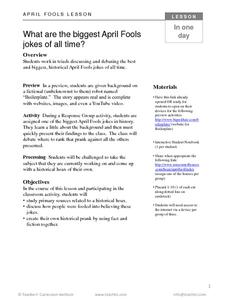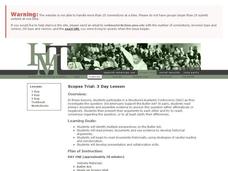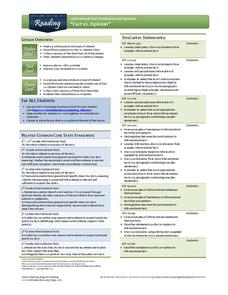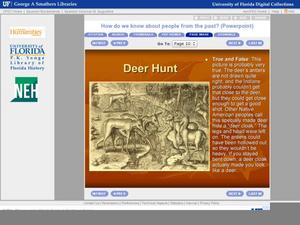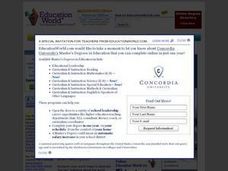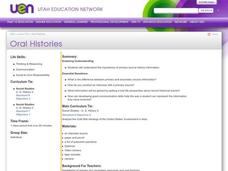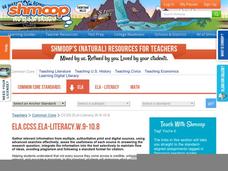K20 LEARN
Plantation Life And Slavery: Antebellum Era
Learners evaluate primary sources from the antebellum era to determine the accuracy of textbooks. They examine narratives from enslaved people, then compare them to their own text. Extension activities include the opportunity to write a...
Daughters of the American Revolution
Lesson 1: How Do Society’s Expectations Influence Education?
The history of women's education can be traced back to the delicate stitching of student samplers from the 19th century. Modern-day pupils examine and analyze four primary sources, three of which are images of embroidered samplers, which...
Social Media Toolbox
Verification
When you're putting together a great story, you've got to consider the source! Scholars discover the dangers of errors in reporting during the 14th activity in a 16-part Social Media Toolbox series. Groups collaborate to create a source...
Ford's Theatre
How Perspective Shapes Understanding of History
The Boston Massacre may be an iconic event in American history, but perhaps the British soldiers had another point of view. Using primary sources, including reports from Boston newspapers and secondary sources from the British...
Curated OER
With Malice toward None: Lincoln's Assassination
Students analyze primary documents regarding Lincoln's assassination. In this lesson on Lincoln's assassination, students analyze three primary sources of information regarding President Lincoln's assassination.
TCI
What Are the Biggest April Fools Jokes of All Time?
After working in groups to analyze primary sources related to a historical hoax, learners will discuss how people managed to be fooled and work to identify one of the biggest April Fools jokes in history.
Centers for Disease Control and Prevention
Youths Are Exposed to E-Cigarette Advertisements from Multiple Sources
The use of tobacco and alcohol use among young people is increasing. Vaping in particular, is gaining popularity with middle and high school students. A colorful infographic details the top four sources of advertising accessed by young...
Historical Thinking Matters
Scopes Trial: 3 Day Lesson
Was the Scopes trial more complicated than a simple debate between evolutionists and creationists? As part of a structured academic controversy (SAC) activity, pupils consider multiple perspectives of the Butler Act and engage in close...
For the Teachers
Fact vs. Opinion
Many informational texts are written as factual, but can your learners determine when an opinion is presented as fact? Have your kids read several articles on the same topic and record the statements that contain either facts or...
Humanities Texas
Primary Source Worksheet: Excerpt from Reagan's Speech "A Time for Choosing"
An excerpt from Ronald Reagan's October 27, 1964 speech in support of presidential nominee Barry Goldwater, "A Time for Choosing," is the text for primary source analysis activity. After reading the document, learners respond to seven...
Curated OER
Primary Energy Sources Pros and Cons
Young scholars explore the different types of renewable and nonrenewable energy sources. In this earth science lesson, students discuss the pros and cons of each type. They conduct a variety of experiments on renewable energy.
Curated OER
Debate on Energy Sources
Students participate in a debate on the best future energy source for automobiles. In this energy sources lesson, students research and present information on a particular energy source and present their source to the class. After the...
Curated OER
How Do We Know About People From The Past?
It's not enough to see or just read a primary source document; one has to analyze them fully to understand their historical implications. First learners are introduced to what primary and secondary sources are, then they read a bit of...
Curated OER
Current Sources of Energy to Maintain a Sustainable Future
In small groups, fourth graders identify different sources of renewable and non-renewable energy. They research the pros and cons of using each of these resources. They rank household appliances according to energy usage and efficiency....
Curated OER
Introduction to Canada
Ninth graders investigate the country of Canada by examining their media in this geography lesson. They use the Internet to research Canadian newspapers and analyze a topic covered by both US and Canadian media sources. After comparing...
Curated OER
A World of Information
Students analyze data and statistics about countries around the world. They read graphs and charts, color a world map to illustrate the top ten statistics about the world, and write a paragraph to summarize their information.
PwC Financial Literacy
Evaluating Financial Information
Advertising is all around us. Sometimes those advertisements are directed at young people, so it's important for youngsters to recognize false advertising and fraud when they see it. That's what this instructional activity is all about....
Curated OER
Synthesis of Information
Locating and synthesizing information is an essential part of the research process but can be overwhelming for many young writers. Eliminate some of the stress and confusion, this resource suggests, by separating these steps. To focus...
Curated OER
Evaluating Information Quality
Learners evaluate information they are given and identify the quality of the information as fact, fiction, and point of view. In this information quality lesson plan, students also discuss how they can pick out good information verses...
Curated OER
Main Idea in Informational Text
Readers identify main ideas and supporting details using informational texts. In this literacy activity, they make predictions and read the text to find the main ideas. They use a table diagram to define the main idea and supporting...
Curated OER
The Source of Knowledge
Students explore their impressions of several countries and the sources of information that informed those impressions. They examine the changing attitudes of South Koreans toward North Korean by reading and discussing "New Craze in...
Curated OER
Oral Histories
Distinguish the difference between primary and secondary sources. High schoolers discover how to conduct an interview using an individual as a primary source, and why it is important to get a real-life perspective. They either video or...
Shmoop
ELA.CCSS.ELA-Literacy.W.9-10.8
Demonstrate the importance of evaluating and citing sources. Pupils can complete the suggested assignment provided here, or one of your choosing, while focusing on checking that the resources are credible and citing those sources...
EngageNY
Conducting Research: Analyzing a Variety of Sources to Capture Information about My Insect
From picture to words. Scholars analyze a picture of an ant and then list two facts they observed and any questions that may arise. Expert groups from the previous instructional activity then look at a diagram about either an ant or...
Other popular searches
- Information Sources
- Consumer Information Sources
- Product Information Sources
- Library Information Sources
- Health Information Sources







